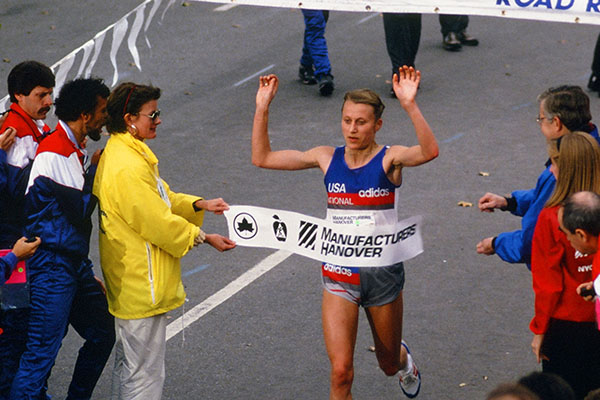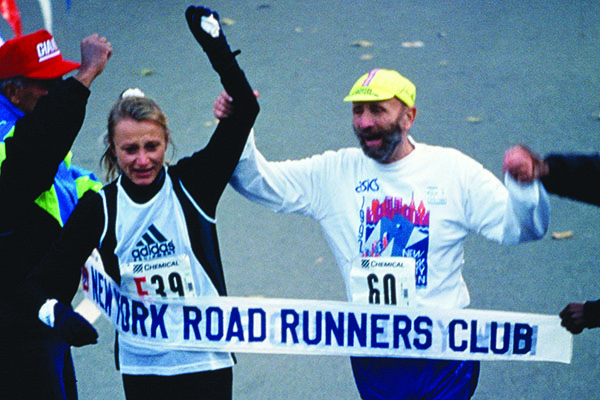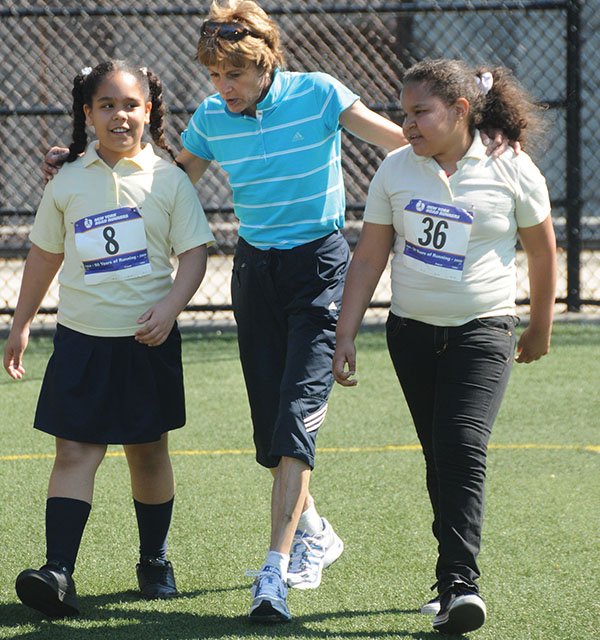The Unassuming Legend

Grete Waitz changed running forever. Rising to legendary status in distance running when women weren't allowed to compete internationally at distances longer than 1,500 meters took guts and perseverance. Becoming an international role model for physical activity for children and cancer patients required compassion, dedication, and diplomacy.
Waitz had it all. She won the New York City Marathon nine times and the New York Mini 10K five times. From 1978 to 1988, she owned the streets of New York each time she began the journey from Staten Island to Manhattan. After retiring from competitive running, she devoted herself to youth and adult fitness and to the fight against cancer—the disease that tragically ended her life in 2011, at age 57.
The Humbling Start of a Marathoning Career
Before her first marathon, Waitz was a Norwegian world-class track athlete who nearly retired after failing to make the 1,500-meter final at the 1976 Montreal Olympics. Private and reserved, she felt crushed by the weight of her country’s expectations.
In Waitz’s marathon debut in New York in 1978, you’d never guess that she detested every painful footfall from the Queensboro Bridge onward. She and her husband, coach, and training partner Jack Waitz decided at the last minute to make the trip to New York, mostly to tour the city. Grete’s longest run before the race had been 10 miles or so, Jack recalled.
“I told her this race would be strange; it will be slow from the start and she should just stay with the other girls because they had run marathons before,” Jack said. “She didn’t listen. She took off at mile 7 or 8, but she really hurt, as most people do without prep for the marathon.”
Grete knew that the race finished in the park, so every time she saw trees, she hoped she was closing in on the end, Jack remembered. She did finish—wearing bib #1173, with nobody knowing who she was—in a world-record time of 2:32:30.
“Grete was only thinking of one thing—of getting to me to give me a hard time for encouraging her to run in the marathon,” Jack said. “She took off her shoes and threw them at me. I was lucky nobody spoke Norwegian at the finish line because she used some bad words.”
Waitz Dominates in New York
The couple extended their trip so Grete could appear on Good Morning America the next day but her 15 minutes of stardom didn’t convince her to embrace the marathon. Instead, she decided to retire from running.
But the sport wouldn’t let her. When they got home, Jack got calls from Runner’s World magazine and race promoters offering to pay for their travel to run in races around the world.
They learned quickly to be better prepared the next time. “I took more charge of her training; it was fun,” Jack said. “We learned more about nutrition for marathons. She knew what she had to eat and do, and she did it — she was very professional. There were no secrets, just hard work.”
Waitz returned to New York in 1979 and 1980 to defend her title, and each time she bettered the world record, clocking sub-2:30 finishes. She also won the 1983 World Championships Marathon. Her relentless pursuit caught worldwide headlines and, in 1984, women were finally allowed to compete in the marathon at the L.A. Olympics. Waitz took home the silver medal in that race. She also won the London Marathon in 1983 and 1986, and the Stockholm Marathon in 1988, the same year as her final win in New York. Along the way she earned five world records and achieved royalty status in her home country.
“Her legacy in Norway came together with women’s liberation,” Jack said. “She did a lot of promotion for women’s running, and changed the outlook for women in running in Norway.”
One More Marathon

Waitz's last marathon, New York City in 1992, wasn’t a shout-worthy sprint to the tape, but it was every bit as memorable and even more heroic. Waitz ran all 26.2 miles with New York City Marathon co-founder and race director Fred Lebow, who was in remission from the brain cancer that would end his life two years later.
Breaking records and changing minds about what women could achieve in the sport had taught her poise. She tried to step aside before the finish line, but Lebow grabbed her arm and they tearfully bent the tape together.
Paving the Road to Running for Kids

Waitz built a legacy in running not only for women but also for children. Shortly after the New York Road Runners Foundation was formed in 1998 and the first middle school youth running programs launched in New York City in the fall of 1999, Waitz joined the organization as its chairwoman.
Serving as an honorary figurehead wasn’t part of Waitz’s constitution. She dug in and was present. When she was in New York, she’d make appearances at schools and youth events where she ran with the kids, wrote a column for the newsletter, and became the honorary coach of Team for Kids, adult marathoners who would raise money for the Foundation.
“Grete was incredibly humble, yet she wore the mantle of the number-one international spokesperson for the sport of running and the New York City Marathon,” recalled Cliff Sperber, NYRR's youth program outreach specialist.

Waitz helped set up an exchange program between youth runners in New York and Norway, and on three occasions, the Foundation (which has evolved into NYRR Community Impact) sent five kids to Norway to spend six days meeting the Queen of Norway, running in relay races, touring Oslo, and visiting Grete and Jack at their home.
“She had all nine of the New York City Marathon plates she’d won displayed prominently,” remembered Chrissy Odalen, NYRR's head of youth programs, who accompanied the group. "I think that shows you what the New York City Marathon meant to her and what she meant to it."
“I don't think Grete was motivated one iota to be a super-star celebrity, but she was motivated to use her celebrity to help people and runners become better,” Sperber said.
Championing Efforts to Change Cancer Treatment
When Waitz was first diagnosed with cancer in 2005, she followed Fred Lebow’s example and stayed as active as she could. Jack recalled her walking five miles on the treadmill one day while she was going through treatment. It reminded her how movement was a vital part of her fabric. If she could do it, others going through cancer could, too.
“She believed fitness should be part of cancer treatment because of the physical and mental benefits. Going through cancer treatment is stressful and very difficult so she used running as her outlet,” said Melissa Nadasdi, social impact associate at WCPG, New York-based agency partners of AKTIV Against Cancer.
AKTIV Against Cancer was founded in 2007 by Waitz and Helle Aanesen with the hope that physical activity will become part of standard cancer treatment. The organization has opened 16 centers in cancer treatment hospitals in Norway and one at the Memorial Sloan Kettering Exercise Oncology Unit in New York City. Patients can work out with physicians with expertise in cancer biology in mirrorless “judgment-free zones.”
“We hear stories from people with cancer who say that physical fitness helps them retain a sense of normalcy,” said Nadasdi. “Grete wanted to share that message.”
This mantra lives on in what Waitz built with AAC and, long before that, when the marathon taught her who she was to become.
A Forever Hero
A sculpture of Waitz in her prime — legs bounding forward, ponytail billowing behind — stands outside of Bislett Stadium in Oslo. The sculpture honors how she gave unobstructed access to competition for an entire gender.
Waitz was inducted into the NYRR Hall of Fame in 2011.
The $17 million AKTIV Against Cancer has donated to support normalizing fitness for cancer patients validates Waitz’s altruistic vision. And the stories those who knew Waitz share about her unique spirit, indomitable work ethic, and kindness continue to speak volumes.
These memorials speak loudly about the private, reserved woman who gave so much to our sport. To follow in her footsteps means we honor her example.
Celebrate and honor the legacy of Grete Waitz by registering to run the NYRR Grete's Great Gallop 10K in Central Park on Saturday, August 27. Race on the same course where Grete won her five NYRR New York Mini 10K titles and where she ran the final miles of her record nine New York City Marathon victories.
